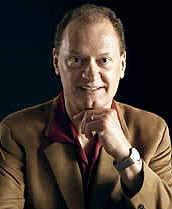A renowned author, speaker and educator, Dr. Frank Wildman is recognized as a pioneering advocate for the work of Dr. Moshe Feldenkrais-- a philosophy and system of movement that has revolutionized the treatment for pain and loss of energy associated with daily activity, exercise and aging. For nearly 40 years, Wildman has been a teacher, practitioner and mentor to countless medical professionals, athletes, fitness experts, musicians, dancers and a host of others who have embraced the proven health benefits of this sensory-motor learning method.
 Wildman was a young choreographer and performer with Anna Halprin’s dance troupe in San Francisco when he met Dr. Moshe Feldenkrais, the physicist, engineer and Judo Master who developed an extremely effective somatic education method, a system of movement which describes how each motion is the result of many parts of the body working in concert with the mind. Simply put, the work of Dr. Moshe Feldenkrais is based on the premise that becoming more aware of one’s movements, and exerting less effort, can relieve stress, reduce pain, enhance agility and make life more enjoyable.
Wildman was a young choreographer and performer with Anna Halprin’s dance troupe in San Francisco when he met Dr. Moshe Feldenkrais, the physicist, engineer and Judo Master who developed an extremely effective somatic education method, a system of movement which describes how each motion is the result of many parts of the body working in concert with the mind. Simply put, the work of Dr. Moshe Feldenkrais is based on the premise that becoming more aware of one’s movements, and exerting less effort, can relieve stress, reduce pain, enhance agility and make life more enjoyable.
Fascinated by Dr. Moshe Feldenkrais’ philosophy and teachings, Wildman went on to study with him for a decade while simultaneously acquiring degrees in Physical Education, Biology and Somatic Psychology. While studying patterns of animal movement and child development, Wildman recognized links between psychology and the science of motion. This insight grew into an innovative understanding that has influenced the entire field of movement studies and has led to advances in physical therapy that have been adopted internationally by hospitals, universities, physical and occupational therapists, and somatic psychologists.
In 1985, Dr. Wildman founded the Movement Studies Institute, which has gone on to become one of the world’s premier training organizations. His goal was to make the techniques clear and teachable to future practitioners as well as the general public across North America, Europe, Australia, and Japan. As the first educational director of a professional training program, he has guided the certification of a host of practitioners and allied health professionals through the years. Wildman has also helped develop and define the standards of practice that are current guidelines nationally and internationally for students of the work of Dr. Moshe Feldenkrais.
Dr. Wildman has directed nearly thirty professional training programs in the United States, Europe, Australia, and Japan, and has introduced Dr. Moshe Feldenkrais' work to organizations as diverse as the Australian Institute for Sport and the American Back Society. His signature programs, “The Evolution of Motion,” “Your Brain as the Core of Strength and Stability,” and “Reconstructing Dance Technique,” distill his lifetime of experience in science, education and clinical practice into brief but powerful courses.
He is also the author of the popular Intelligent Body® series, a complete line of sensory-motor lessons on audio and DVD, and the newly published Change Your Age, designed to rewind years of bad habits and encourage the discovery of innately healthy, pain-free methods of movement.
Dr. Wildman maintains a private practice in the San Francisco Bay Area.
According to Kathryn Ross-Nash, one of the founders of of the Pilates Guild, “Frank is about teaching and educating the person, instead of forcing someone through an exercise by repetition of a movement. He has given me another vantage point and a whole other vocabulary to communicate with my students.”
Paul Davidson, MD, internist and rheumatologist and author of the best-selling Chronic Muscle Pain Syndrome, says, “There are ways that will lead you to a more active, healthy and safer life and you will feel, look, and act younger. One of the best ways to do this is to read Change Your Age and follow the advice of Dr. Frank Wildman. He is a master teacher of many forms of vital movement therapy. I can highly recommend this book to all who wish to improve their well-being.”
